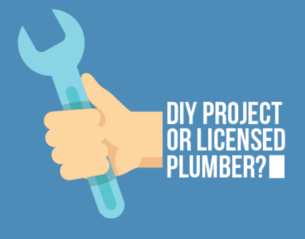Drain Blockages and Leaks
What Lies Beneath Your Home Might Surprise You
Under every home is a network of drainage pipes that keep everything in our home flowing smoothly. But like anything else, out of sight also means out of mind for most of us. Plumbing is something we don’t often give much thought to until we have a sink, shower or toilet back up on us.
Like anything else that has been around awhile all plumbing pipes have a life span. Over time clay tiles, galvanized pipe, copper pipe and even plastic pipe will deteriorate. When it does breakdown, because of corrosion or roots growing into it, that’s when we have to deal with back upped drains or leaks.
Know What Type of Drain Pipe Is Used in Your Home
The type of plumbing pipe found in your home will primarily be dictated by when it was built. Older homes built prior to 1960 will more likely be using DWV (drain/waste/vent) piping made of cast iron or galvanized steel. Homes built since 1960 typically will have copper, PVC or ABS piping. PVC and ABS pipe are plastic compounds.
Each type of pipe offers advantages, but the durable and less expensive PVC pipe is used most often today.
Plumbing All Flows to One Spot
Your kitchen sink and bathtub have separate drain lines, but they ultimately all connect to a single line that leads to the sewer. Knowing how your plumbing drains work is important when determining why and where a blockage occurs.
Main sewer line clogs usually cause water to back up out of one or more drains in your home. These clogs can cause a gurgling sound to come from your drains. Possible signs include your toilet water bubbling, water backing up from your tub or shower when you flush, or water bubbling from your faucets.
How to Keep Drain Pipes in Good Shape
There are a number of factors that can lead to issues in your plumbing system. Addressing these conditions early will prevent them from becoming bigger problems later.
- Keep Water Pressure at Appropriate Levels

- Beware of High Mineral Content in Water
- Soften Hard Water
- Call a Plumber to Snake Sewage Line/Pump Septic Tanks
- Don’t Allow Water to Freeze in Pipes
Leave Drain Repairs to a Licensed Plumber
 Every homeowner should know the basics of home drain maintenance. But there will be times when drain pipes simply break down and need to be repaired or replaced.
Every homeowner should know the basics of home drain maintenance. But there will be times when drain pipes simply break down and need to be repaired or replaced.
Licensed plumbers have received the training that allows them to look at your home’s plumbing as an integrated system. Having this knowledge ensures that other factors like flow rate, line pressures, pipe sizes and pipe slope all factor into a plumbing system that will not have reoccurring problems.



